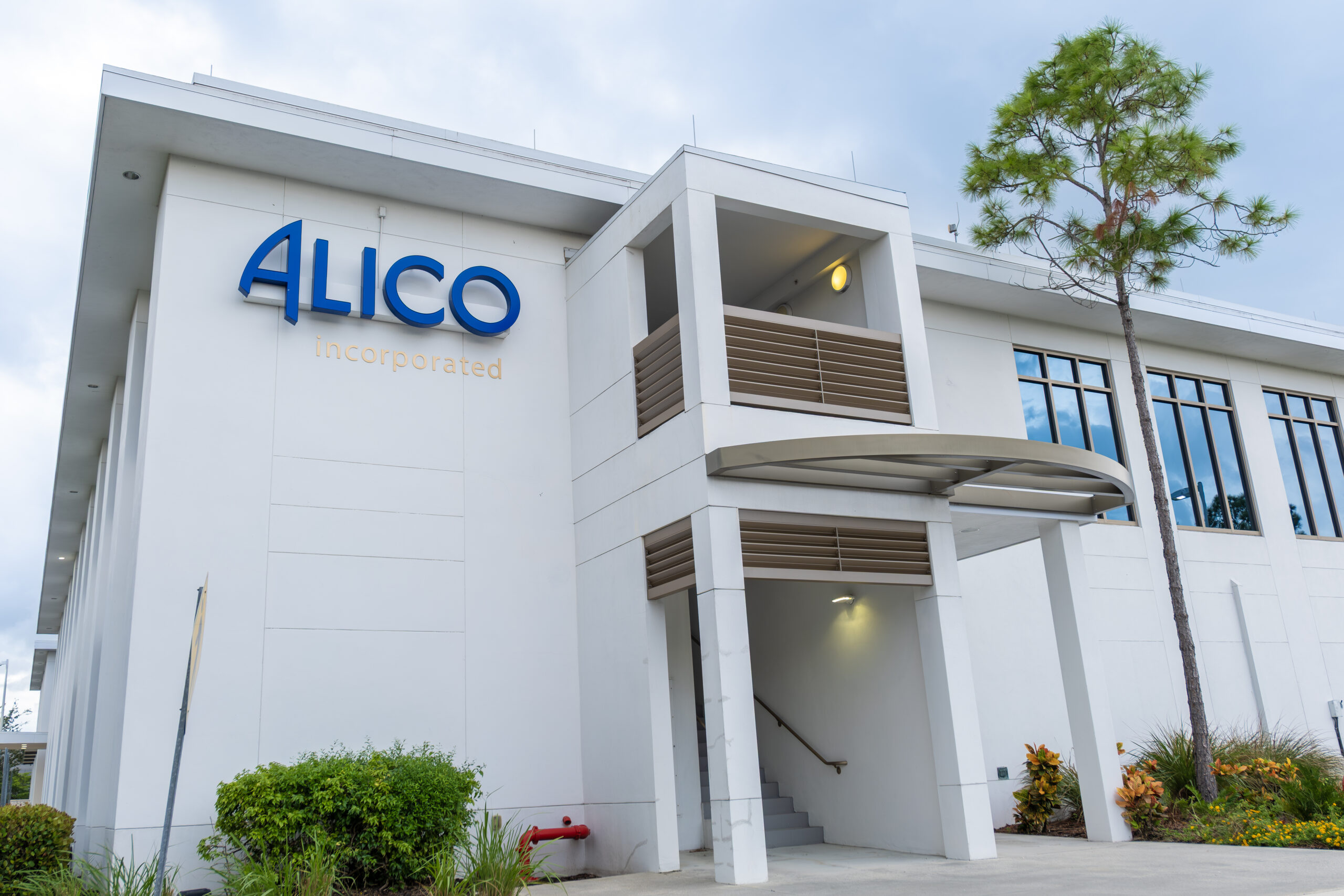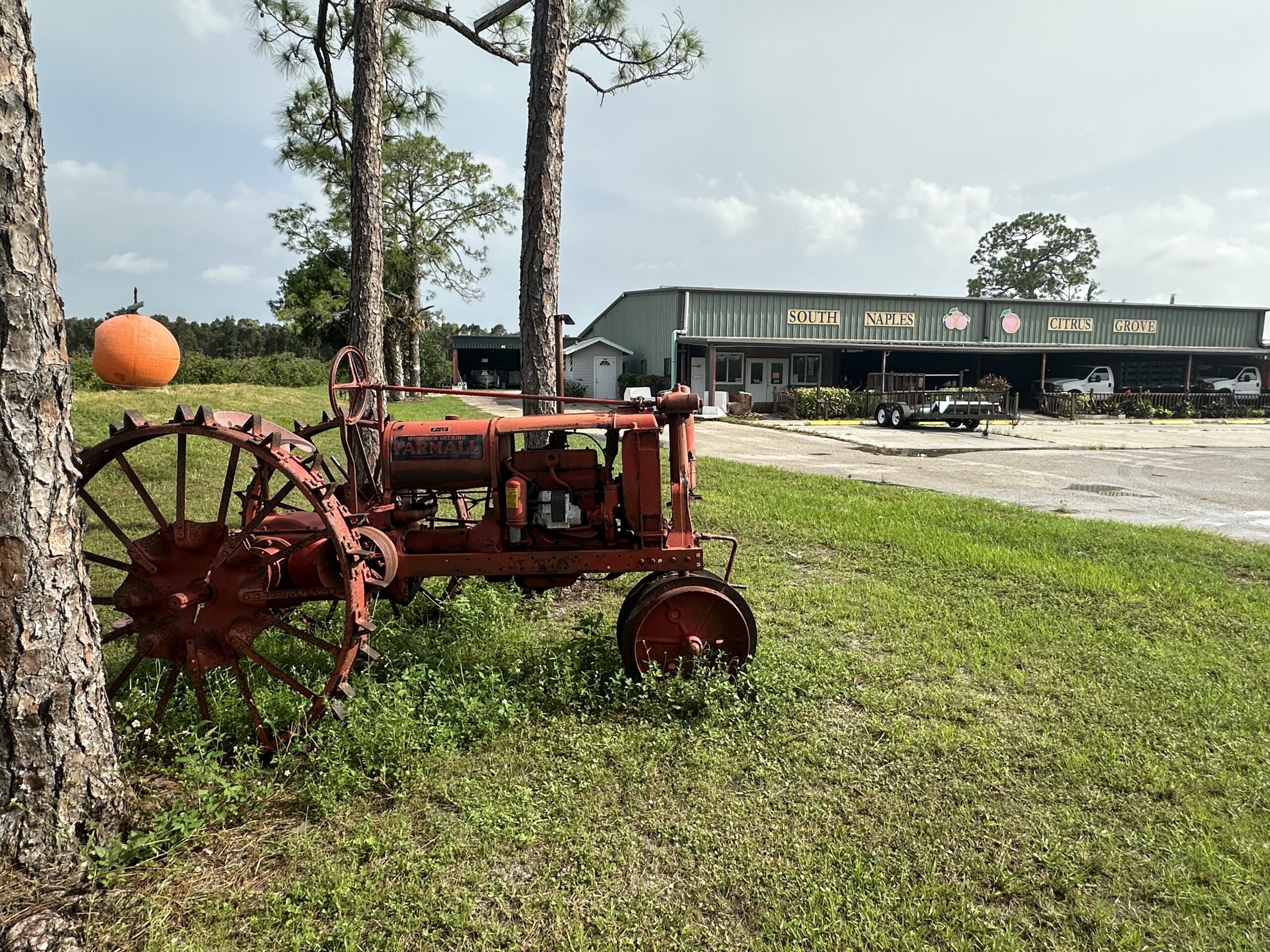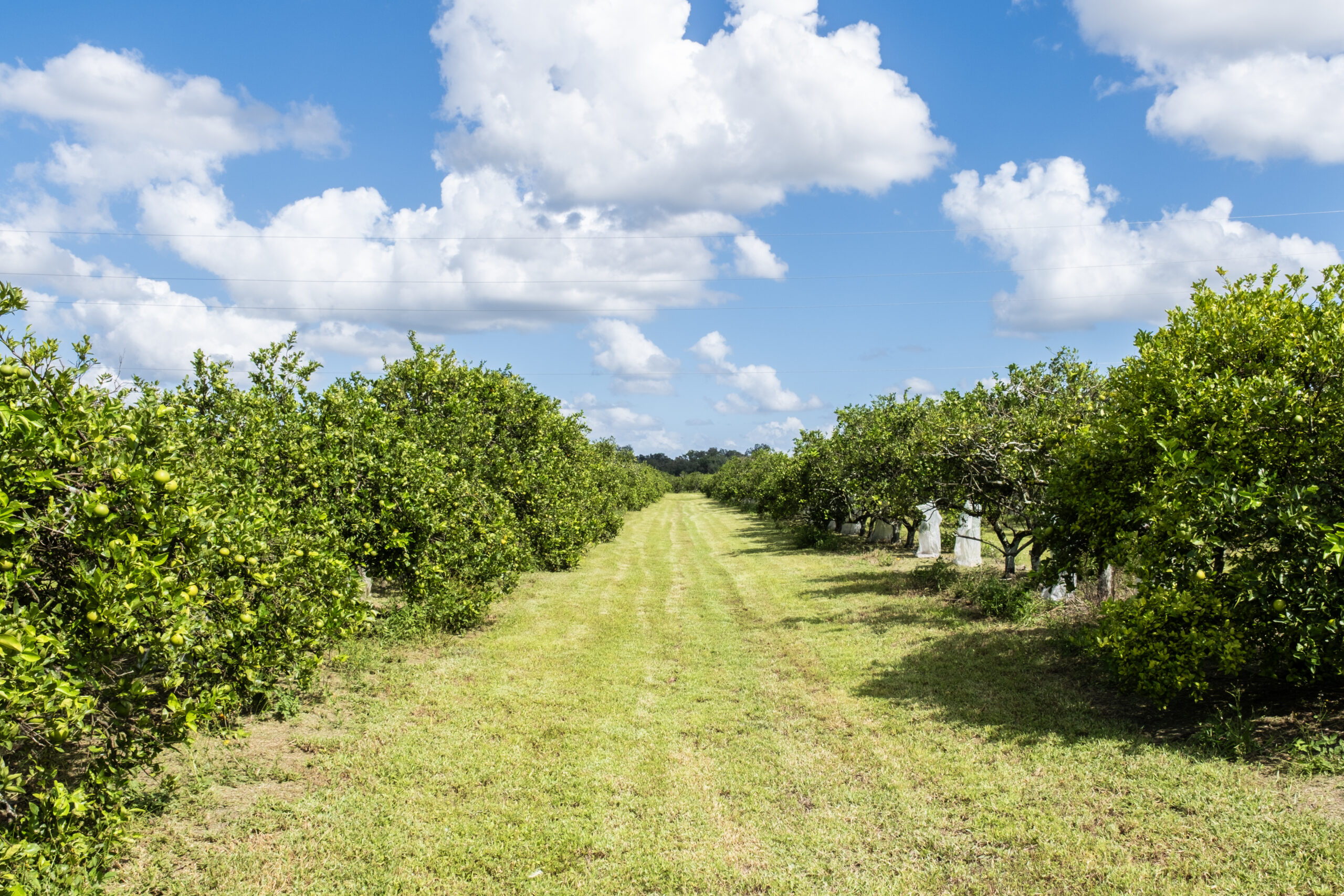
Citrus production has begun slowly and is dying off for many businesses in Southwest Florida, turning to real estate instead. -DAVID WISHTISCHIN / FLORIDA WEEKLY
The shifting landscape of citrus hasn’t spelled the end for Florida agriculture; instead, it has opened the door to reinvention.
Across the state, land once lined with orange trees is being transformed into communities and commercial centers, creating new growth opportunities. From Charlotte County to Palm Beach, landowners are finding ways to stay profitable, conserve resources and embrace the demand for housing and commerce.
As more people flock to the Sunshine State, the need to convert land is high. U.S. Census data says that, in 2022, Florida became the country’s fastest-growing state for the first time since 1957. The state’s amended “Live Local Act” makes it easier to rezone agricultural and industrial land for multifamily or mixed-use projects.
From groves to villages

Alico Inc. has undergone changes over the last several years, turning towards real estate over citrus production. -DAVID WISHTISCHIN / FLORIDA WEEKLY
This year, Alico Inc., the parent company of Alico Citrus, announced it would halt citrus operations due to citrus greening disease and environmental factors. Alico owns and manages almost 54,000 acres of land in Florida across multiple counties, along with gas and mineral rights.
In March, the company took a significant step in its long-term growth strategy by submitting a development application for Corkscrew Grove East Village, the first phase of a 3,000-acre master-planned community in northwest Collier County. Alico plans to dedicate 6,000 acres to long-term conservation as part of the proposal.
Alico Inc. President and CEO John Kiernan was quoted in the Business Observer saying, “Winding down our citrus operations … allowed us flexibility to sustain the business going forward and to really reevaluate acre by acre and helps us identify that about 25% of all those acres have a potential for something other than agriculture.”

South Naples Citrus Grove plans to close, bringing an end to the area’s last orange grove and farm stand. -KELLY J FARRELL / FLORIDA WEEKLY
Collectively known as Corkscrew Grove Villages, the project is a key component of the Collier County Rural Land Stewardship Area (RLSA) program. It serves as a guiding foundation that promotes sustainable growth while safeguarding sensitive lands.
Under the application, two 1,500-acre mixed-use villages, Corkscrew Grove East and Corkscrew Grove West, would rise near the intersection of Collier, Lee and Hendry counties, creating a new residential and commercial hub for the fast-growing region. If approvals move forward as anticipated, Alico expects to break ground as early as 2028 or 2029.
Rezoning in Charlotte County
In Charlotte County, the Agriculture and Natural Resources Advisory Committee (ANRAC) was established in 1992 to guide on issues affecting the county’s rural and agricultural landscape. The nine-member volunteer panel represents a diverse range of expertise, including livestock and citrus production, vegetable farming, aquaculture and honey production, and rural land use and environmental law.

Oranges like these are still in the process of growing to be ready for production. -DAVID WISHTISCHIN / FLORIDA WEEKLY
The committee also serves as a liaison between county staff and the public, helping to exchange ideas that could shape the county’s agricultural and environmental future. Yet even as ANRAC works to safeguard agriculture, development pressures continue to mount.
The Pulte Group submitted a proposal to rezone more than 4,500 acres of agricultural land in east Charlotte County. It aims to increase the maximum number of homes from 6,000 to 8,000 units and expand commercial space from 1 million to 1.5 million square feet. The county Planning and Zoning Board denied the proposal 3 to 1. However, county commissioners will make the final decision.
In a related report, David Farmer, lead consultant of the Metro Forecasting Models, said, “Over 4.2 million square feet of new industrial space is projected by 2050, and up to 18 to 19 million square feet needed to match peer counties like Lee and Sarasota, the county is poised to become a major employment and logistics hub.”

As citrus companies move towards real estate, Maronda Homes is an example of the growing housing in Southwest Florida. -DAVID WISHTISCHIN / FLORIDA WEEKLY
The report also suggests Charlotte County should “either rezone 800 acres of agricultural land near I-75 (such as the Jones Loop area) for future industrial use or encourage mixed-use developments where appropriate, to reduce traffic and support job centers with nearby housing.”
This summer, Harbor Village, a 1,174-acre mixed-use project led by Maronda Homes, secured zoning approval from Charlotte’s Board of County Commissioners and is planned near South Gulf Cove and the Village of Holiday Lake.
The plan was updated to reflect a more thoughtful approach, with fewer homes, decreased commercial space and a greater emphasis on preservation. The latest proposal sets aside 163 acres to protect mangroves and sensitive environmental areas. Designed to blend growth with conservation, Harbor Village will feature new housing, a 200-room hotel, and a marina. This project will help bring jobs, amenities and an economic boost to western Charlotte County.
Charlotte County’s 2050 Land Use Plan allows for converting agricultural/rural zoned properties to residential and commercial uses through amendments to the Future Land Use Map. The changes would allow for further development pressure and proposals by large developers.
“We looked at areas that were along major roadways, like U.S. 17 and Burnt Store Road, that were aged. It’s pretty common sense that if you’re along a main roadway like that, eventually agriculture is going to convert to something else. That’s pretty typical,” said Shaun Cullinan, Charlotte County planning and zoning official.
Farms to become homes in Palm Beach County
In Palm Beach County, Mecca Farms, based in Lake Worth Beach, announced residential homes would replace its 26 farm acres south of Wellington. For more than 50 years, the Mecca family farmed tomatoes on property located near State Road 7 and Lantana Road.

While several companies in Southwest Florida have chosen to move away from citrus production others are still growing. -DAVID WISHTISCHIN / FLORIDA WEEKLY
According to documents filed with the county, the site on the far side of South Florida National Cemetery will become Reserve at Eagles Landing.
Palm Beach County commissioners unanimously approved the necessary zoning changes to allow the development to move forward, with the zoning change from Agricultural Residential to Residential Single Family.
In addition, Indian Trails Grove, also in Palm Beach County, which was once a sprawling farmland, has been rezoned to accommodate about 3,900 homes.
Last year, the Village of Wellington was approved for rezoning 258 acres of newly annexed agricultural land, clearing the way for new residential and retail projects. In June of this year, Palm Beach County officials approved a Delray Beach proposal to rezone 75 acres of rural farmland for a 240-townhome community, reflecting the continued demand for housing across the region.
Innovations in agribusiness
Florida Atlantic University researcher Arslan Munir, Ph.D., received a grant to lead a multi-university project to advance precision agriculture. The FogAg project is designed to help farmers manage two of the biggest challenges in modern agriculture: water and nitrogen use.
By combining machine learning and innovative sensors, farmers will get site-specific insights to boost yields while conserving resources and reducing environmental impact.
“This research epitomizes the kind of forward-thinking, impact-driven innovation at Florida Atlantic University,” Stella Batalama, Ph.D., dean of the College of Engineering and Computer Science, stated in a press release. “Professor Munir’s work is a great example of how engineering can lead to transformative change in critical sectors like agriculture. The integration of smart technologies into farming practices not only addresses urgent global challenges around food security and sustainability but also reinforces our role as a leader in cross-disciplinary research with real-world impact.”
“We try to take a hard look at how agriculture has been and will continue to evolve in this area of Florida,” said Fritz Roka, Ph.D., director of the Center of Agribusiness at Florida Gulf Coast University. “We got our insights from talking to people in the industry, agribusiness executives, people who have more than a field-level view of a farm but more of a focus on across the whole industry and supply chain,” Roka said.
According to a study by the Center of Agribusiness, “Cattle, citrus, ornamental nurseries, sugarcane, and vegetable operations occupy more than 40% of the arable land across Charlotte, Lee, Collier, Glades, and Hendry Counties. Collectively, these agricultural enterprises generate more than $1 billion in annual farm-gate sales. When combined with food processing operations and agricultural input supply companies, agribusiness food supply chains provide a $5 billion economic base to Southwest Florida.”
According to Roka, the shifts we are seeing locally are similar to what’s happening in other parts of the country as land continues to be converted for residential or commercial purposes.
“As things change and people move in, land gets repurposed for its highest and best use,” Roka said. “It’s just the way our economy has been working. There was widespread consensus that agriculture in Southwest Florida will become more and more productive, and by that, I mean farmers, ranchers and citrus growers are going to figure out better, more efficient ways to grow their crops.”
Roka referred to Bonita Springs as the “Silver Springs” of Southwest Florida.
“As anybody can see and witness, that’s prime real estate development. People who move into the state who are not farmers, who want to live near the coast or the beach, all that land has been repurposed for residential and commercial housing; therefore, agriculture has been pushed over time,” Roka said. “Maintaining, if not enhancing, the economic viability of farming and ranching operations will be key to agriculture’s survival and its overall economic impact in Southwest Florida”, the report states.
One thing about Florida is certain: Its landscape will continue to evolve. While agriculture remains part of the story, development is creating fresh ways to use the land.
With the right mix of science, market support and grower commitment, Florida citrus has the capacity to adapt, innovate and grow, as the Sunshine State continues to reinvent itself for the future.

